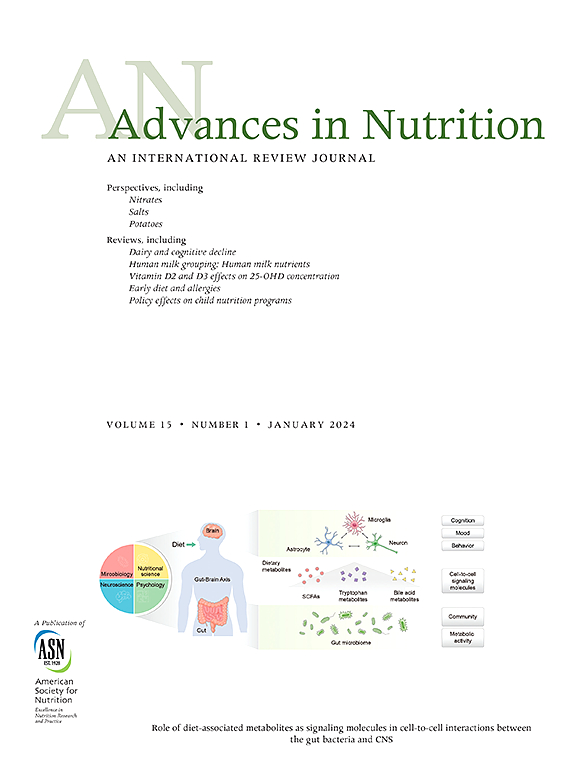妊娠期使用生姜生物活性化合物:证据扫描和现有荟萃分析综述。
IF 8
1区 医学
Q1 NUTRITION & DIETETICS
引用次数: 0
摘要
背景:生姜是一种常用的非药物治疗方法,可用于治疗与妊娠有关的症状,包括恶心和呕吐、炎症和胃肠功能紊乱。在妊娠期和哺乳期,确定生姜的疗效尤为重要,因为此时可能会对母体和新生儿产生不利影响:这项证据扫描和总体回顾旨在评估有关孕期和哺乳期使用生姜膳食制剂的有效性和安全性的证据的范围和质量:方法:我们检索了截至 2023 年 12 月 20 日的 MEDLINE、Embase、CAB Abstracts 和 International Pharmaceutical Abstracts,以确定与安慰剂或常规药物相比,孕期或哺乳期使用生姜的相关孕产妇和新生儿结果。对干预研究的荟萃分析(MA)结果进行了汇总。采用 AMSTAR-2 工具对综述进行严格评估。对每项纳入的荟萃分析计算主要研究的总体重叠率和配对重叠率。从每篇MA中提取的数据包括生姜效果的简要估计值、生姜治疗的配方、干预时的妊娠时间点、参与研究的人群、干预类型、对比干预以及研究参与者的数量:证据扫描发现了 90 篇与孕期和哺乳期使用生姜相关的文章。关于生姜用于治疗妊娠恶心和呕吐的 7 项 MA 报告了 22 项独立研究,研究重叠率为 49%。与安慰剂相比,大多数生姜对改善妊娠恶心有显著的积极作用,或与常规治疗效果相当,没有证据表明生姜有明显的不良反应。这些评估报告的质量从极低到较低不等:结论:证据表明,生姜能有效减轻妊娠期恶心症状;然而,纳入的研究存在很大的异质性,且质量较低:尽管孕妇普遍使用生姜制剂,但最近关于生姜使用的综述并未关注这一弱势群体食用生姜的潜在健康结果。本文章由计算机程序翻译,如有差异,请以英文原文为准。
The Use of Ginger Bioactive Compounds in Pregnancy: An Evidence Scan and Umbrella Review of Existing Meta-Analyses
Ginger is a commonly used nonpharmacological treatment of pregnancy-related symptoms including nausea and vomiting, inflammation, and gastrointestinal dysfunction. Determining the efficacy of ginger is particularly important during pregnancy and lactation when maternal and neonatal detrimental effects may be a concern. This evidence scan and umbrella review aimed to assess the extent and quality of the evidence regarding the effectiveness and safety of using dietary preparations of ginger during pregnancy and lactation. We searched MEDLINE, Embase, CAB Abstracts, and International Pharmaceutical Abstracts up to 20 December, 2023, to identify maternal and neonatal outcomes associated with ginger use during pregnancy or lactation compared to placebo or conventional medicines. Outcomes for which a meta-analysis (MA) of intervention studies was identified were synthesized in an umbrella review. The AMSTAR-2 (A MeaSurement Tool to Assess systematic Reviews-2) tool was used to critically appraise the reviews. The percent overlap in primary studies was calculated overall and pairwise for each included MA. Data extracted from each MA included the summary estimate of the effect of ginger, the formulation of the ginger treatment, gestational timepoint at intervention, population enrolled in the study, type of intervention, comparator intervention, and number of study participants. The evidence scan identified 90 articles relevant to ginger use during pregnancy and lactation. Seven MAs of ginger use for treating nausea and vomiting of pregnancy reported 22 independent studies with a 49% study overlap overall. The majority of the MAs found a significant positive effect of ginger on the improvement of nausea in pregnancy compared with placebo, or equivalence to conventional treatments, and no evidence of significant adverse effects. The quality of the MAs ranged from critically low to low. The evidence suggests that ginger is effective at reducing nausea in pregnancy; however, the included studies contained substantial heterogeneity and were of low quality.
求助全文
通过发布文献求助,成功后即可免费获取论文全文。
去求助
来源期刊

Advances in Nutrition
医学-营养学
CiteScore
17.40
自引率
2.20%
发文量
117
审稿时长
56 days
期刊介绍:
Advances in Nutrition (AN/Adv Nutr) publishes focused reviews on pivotal findings and recent research across all domains relevant to nutritional scientists and biomedical researchers. This encompasses nutrition-related research spanning biochemical, molecular, and genetic studies using experimental animal models, domestic animals, and human subjects. The journal also emphasizes clinical nutrition, epidemiology and public health, and nutrition education. Review articles concentrate on recent progress rather than broad historical developments.
In addition to review articles, AN includes Perspectives, Letters to the Editor, and supplements. Supplement proposals require pre-approval by the editor before submission. The journal features reports and position papers from the American Society for Nutrition, summaries of major government and foundation reports, and Nutrient Information briefs providing crucial details about dietary requirements, food sources, deficiencies, and other essential nutrient information. All submissions with scientific content undergo peer review by the Editors or their designees prior to acceptance for publication.
 求助内容:
求助内容: 应助结果提醒方式:
应助结果提醒方式:


